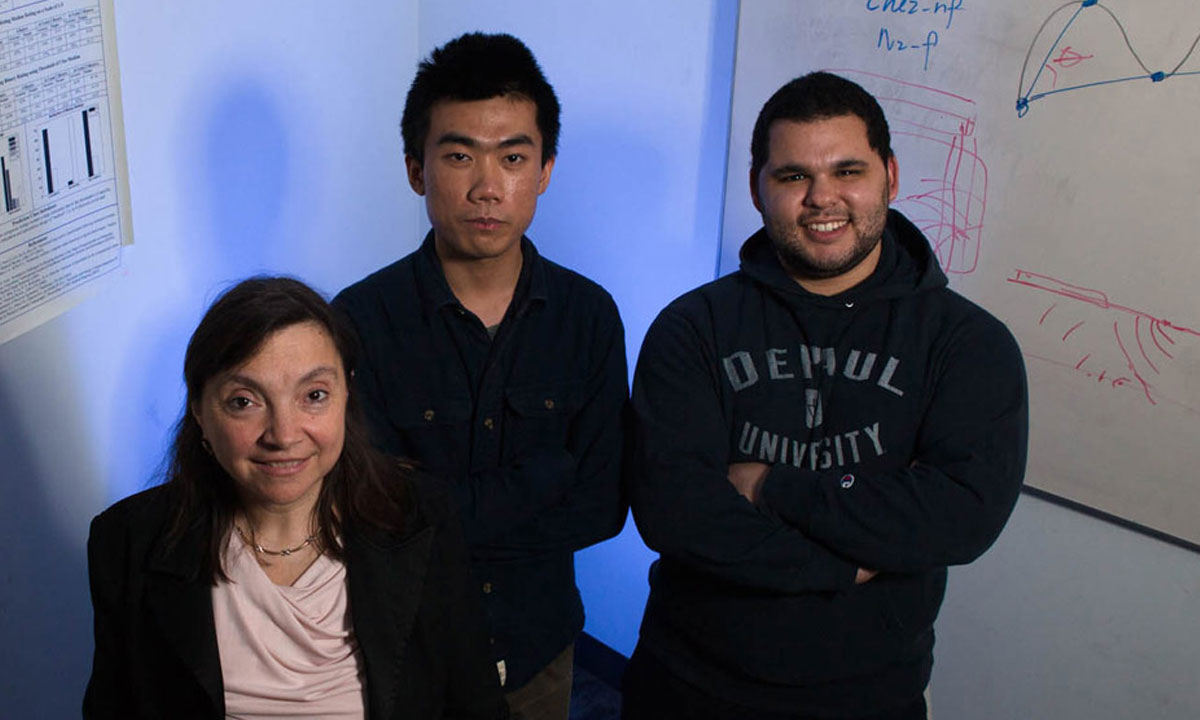Ranked the #7
Computer Science
Program
Fortune (2025)
DePaul’s
MS in computer science offers an exciting opportunity to expand your technical skills—or enter the computing field—and take your career to the next level.
DePaul is a perfect place to earn your master’s in computer science:
The ability to design your degree. DePaul sets itself apart with the ability to customize your MS in computer science to your interests. Cybersecurity, app design, AI, data science—whatever your passion, you can tailor your degree to pursue it here.
The flexibility to fit your schedule and learning style. You can complete coursework online, on campus or a mix of both, based on your schedule and preference. With professors trained in online teaching and focused on your success, we offer flexibility without compromising quality.
The DePaul difference. Small classes. Distinguished, you-focused faculty. Practical, real-world focus, with exciting opportunities to participate in cutting-edge research projects. A strong reputation among the world’s leading employers, close ties with Chicago’s tech and start-up communities, and a large, accessible alumni network. This is the DePaul difference, here to help you advance in the computer science field.
For international students: this is a
STEM-designated program, which can qualify you to extend your post-graduation stay in the United States.
Degree Requirements
Learning Outcomes
Students will be able to:
- Model a computational problem, select appropriate algorithms and data structures for a solution, justify the correctness of the algorithm, and implement an application solving the problem.
- Demonstrate proficiency with fundamental concepts in algorithms, programming languages, software engineering, distributed systems, and databases.
- Demonstrate an in-depth knowledge in at least one area of Computer Science.
- Demonstrate the ability to independently learn and master new software development paradigms, algorithms, APIs, and programming languages.
Career Outcomes
92% Companies hiring our graduates include Abbvie, Amazon, Blue Cross Blue Shield, Fermilab, Motorola Solutions, Shirley Ryan Ability Lab, Wayfair, and more.
-
/MediumPicture/$value) Thiru Ramaraj
Thiru Ramaraj
Associate professor Ramaraj’s research focuses mainly on computational biology and applied bioinformatics. Before joining DePaul, Dr. Ramaraj was a bioinformatics research scientist at the National Center for Genome Resources (NCGR), where he and his team primarily focused on developing computational workflows for high-throughput DNA/RNA sequence data analysis.
-
/MediumPicture/$value) James Riely
James Riely
Professor James Riely studies programming language semantics, with applications to type systems and software security. He joined DePaul University's Foundations of Programming Languages group in 1999.
-
/MediumPicture/$value) Ljubomir Perkovic
Ljubomir Perkovic
Professor Ljubomir Perkovic joined the faculty at CDM in 2000. His research interests include computational geometry, graph theory and algorithms, distributed computing, computer science education, and computational thinking.

Our
CS faculty perform research in a wide variety of areas, with projects funded by the National Science Foundation, National Security Agency, NASA, and more. Students who are looking for hands-on experience and the opportunity to collaborate with faculty in their field of study are encouraged to pursue research opportunities at CDM.
CDM is home to a number of student organizations to fit your interests and career goals. The Computer Science Society (CSS) provides students the opportunity to collaborate on computer science-related projects, expand their computer science education, and hosts events like DemonHacks, our annual weekend-long hackathon. CSS’s goal is to build a community that computer science students can look to as a resource for academics, networking, career improvement, and enjoyment.
This degree can be completed entirely online. One hundred percent of the program’s lectures—from audio and video to whiteboard writing and supplemental materials—are captured and available online.
DePaul University and Rosalind Franklin University of Science and Medicine are funding faculty research projects that bring together artificial intelligence, biomedical discovery and health care. Projects involving School of Computing faculty will combine wearable, robotic sensors with GPS mapping to predict and prevent falls and injury among patients and members of the military, as well as analyze neurons in the brainstem to discover boundaries that control speech and swallowing.
Application Deadlines
| Enrollment Quarter | Domestic Student Deadline | International Student Deadline |
|---|
| Fall | August 1 | June 15 |
| Winter | December 1 | October 15 |
| Spring | March 1 | January 15 |
| Summer | May 1 | April 15 |
Admission Process
The graduate application process involves completing an online application, sending in your transcripts and submitting any supplemental material (e.g., letters of recommendation, certifications, etc.). To learn more about your program specific requirements, visit our
Graduate Admission page.
Admission Requirements
Contact Graduate Admission